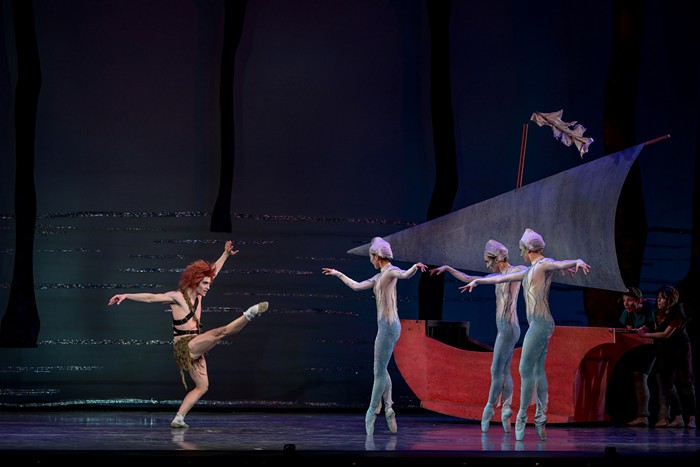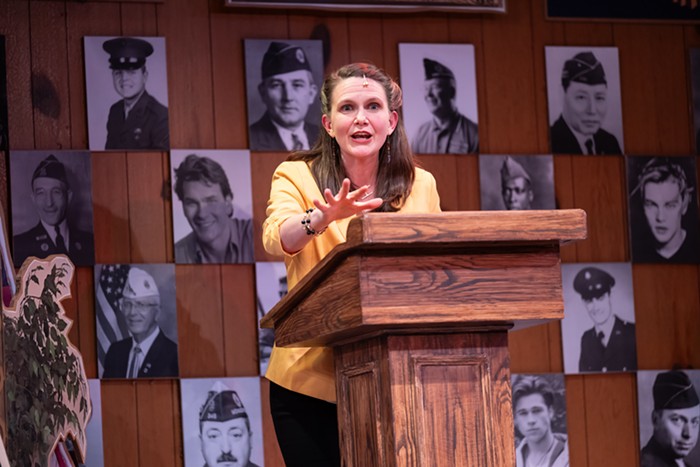John Kolvenbach's Fabuloso, currently closing out Third Rail Repertory's first season at the World Trade Center, is a rompy little domestic fable depicting the lifestyle clash of two very different couples. Like an inversion of Who's Afraid of Virginia Woolf?—complete with rapacious boozing and nonsense nursery rhymes—Fabuloso posits not that conventional relationships are fundamentally hollow, but that they're fundamentally unfun.
Hangdog Teddy (Philip Cuomo) and his overbearing wife Kate (Stephanie Gaslin) serve here as the sign bearers of conventionality, acting out scenes of depressing domestic tedium that revolve around Teddy's job as a girls' soccer coach. Kate, whose beige-and-black outfits match her blandly neutral living room, tries to bully a spark out of Teddy, but he doesn't perk up until he receives the unexpected word that his dear childhood friend Arthur is coming to visit.
Arthur (Tim True) and his unhinged fiancée Samantha (Valerie Stevens) are like ambassadors from the Land of Make Believe, two adults who play elaborate games of pretend with the deadly seriousness of children. Whether playing at murder, playing dead, or playing—in one of the show's most memorable scenes—at being dancers in Fame, the two live life at an exhausting pitch, ever-craving new kinds of stimulation. This generates ample tension between Samantha and Arthur's high-wire antics and the comforting domestic drear to which Kate in particular longs to return—especially when it appears that Arthur and Samantha plan on staying for good.
Valerie Stevens is one of the most fearless performers in Portland, and here she flings herself into the comedic stratosphere with nary a thought for a safety net. Stevens and Tim True are as good as local actors get, and it's a genuine pleasure to watch them inhabit and humanize characters that, in less capable hands, could have quickly dissipated into caricature. Philip Cuomo and Stephanie Gaslin are better than their material—Kolvenbach's script devotes more stage time to songs and silliness than to plumbing its characters' emotional depths, but Cuomo's Teddy brightens in skillful increments as the show progresses, while Gaslin mercifully loses her character's more strident overtones. By show's end, the two once-dissatisfied lovers have softened into characters who appear to genuinely like one another.
There's much to recommend about this production—why, then, does it rank among one of this fine company's weakest offerings? Momentum has a lot to do with it. Fabuloso benefits not a bit from leisurely interludes between scenes—during each scene change, Seinfeld-esque music pops, colored lights suffuse the stage, and stagehands fussily reshuffle chairs. Momentum all the while leaks out the cracks, leaving the audience an unwelcome amount of time to ponder just what it all means. These frequent, labored scene changes are the theatrical equivalent of yelling "car" every 10 minutes, relegating games to the sidewalk while the grownups take care of practical matters.
It doesn't help that Kolvenbach's script, while heavy on silliness, scrimps on the emotional ballast. It's fun to watch these characters learning to have fun, but the play's loopiness seems entirely self-contained, with little bearing on life outside the theater. Given a goofball script and direction that stalls any sense of urgency, the good-hearted Fabuloso is less rewarding than the Third Rail's customarily sophisticated productions.



















